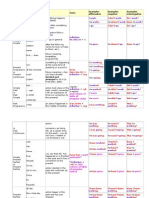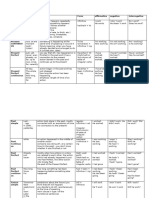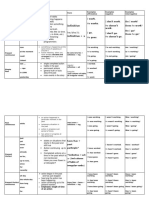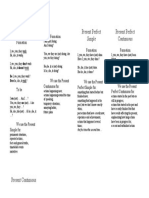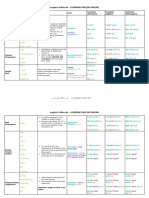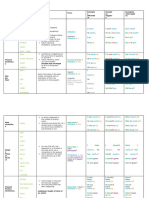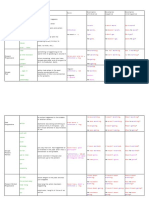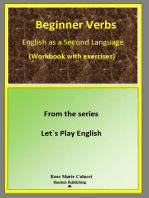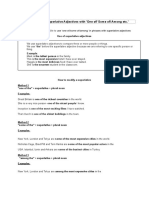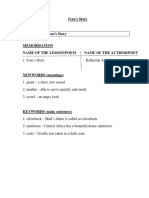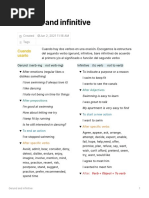All English Tenses-Handout
All English Tenses-Handout
Uploaded by
benrekiaaya12Copyright:
Available Formats
All English Tenses-Handout
All English Tenses-Handout
Uploaded by
benrekiaaya12Original Title
Copyright
Available Formats
Share this document
Did you find this document useful?
Is this content inappropriate?
Copyright:
Available Formats
All English Tenses-Handout
All English Tenses-Handout
Uploaded by
benrekiaaya12Copyright:
Available Formats
I.
English tenses table Structures and Usage Examples
Used colors:"I," "you," "we," and "they" are considered plural, while "he," "she," and "it" are singular.
Auxiliary verbs: Have (as a main verb) ,Was/Were (as part of "to be") , Had (as a main verb) ,Will/Shall (as auxiliary verbs).
Negative Form Question Form Time-Related Keywords
Tense Structure Use
Subject + base verb do not/Don't work. Do I work? Always, usually, sometimes, every day,
They work General statements, regularly, frequently, rarely, seldom, often,
Present
Simple
facts, and habits does not/doesn't Does she work? etc.
He works
Subject + am/is/are + present participle am not/Isn't/Aren't working. Am I working? Now, at the moment, currently, nowadays,
Continuou
They are working presently, this week/month/year, today, etc.
Actions happening now
Present
Is he/she/it working? Is she working?
He is working
s
Subject + have/has + past participle I have not/Haven't worked. Have I worked? Yet, already, ever, never, recently, so far, until
They have worked now, up to now, since, for, just, etc.
Completed actions with
Present
Perfect
She has not/hasn't worked. Has she
relevance to the present
He has worked worked?
Subject + have/has been + present I have not/Haven't been Have I been For, since, how long, lately, recently, all
participle Continuous actions working. working? day/week/month, etc.
Continuous
They have been working starting in the past and
Present
Perfect
continuing into the She has not/hasn't been Has she been
He has been working present working. working?
Subject + past tense verb I did not/Didn't work. Did I work? Yesterday, last week/month/year, in 1990,
They worked ago, just now, in the past, etc.
Completed actions in the
Simple
She did not/didn't work. Did she work?
past
Past
He worked
BENMEDDOUR HAOUA benmeddourprof@yahoo.com
Subject + was/were + present participle I was not/Wasn't working. Was I working? At 6 pm, when, while, during, at that time,
Continuou They were working
Actions in progress at a etc.
She was not/wasn't working. Was she
specific time in the past
Past
He was working working?
s
Subject + had + past participle I had not/Hadn't worked. Had I worked? Before, after, by the time, until, by 2010,
They had worked An action completed already, just, etc.
Perfect
before another action in She had not/hadn't worked. Had she
Past
He had worked the past worked?
Subject + had been + present participle I had not/Hadn't been working. Had I been For, since, how long, all morning/day/week,
They had been working working? by the time, etc.
Past Perfect
Continuous
Continuous actions that She had not/hadn't been
He had been working were ongoing before
working. Had she been
another point in the past
working?
Subject + will/shall + base verb I will not/Won't work. Will I work? Tomorrow, next week/month, in 2030, soon,
They will/shall work in the future, etc.
Predictions and
Simple
Future
She will not/won't work. Will she work?
spontaneous decisions
He will/shall work
Subject + will be/shall be + present I will not/Won't be working. Will I be At 5 pm tomorrow, during, while, this time
participle working? next year, etc.
Continuous
They will/shall be working Actions in progress at a She will not/won't be working.
specific time in the
Future
Will she be
He will/shall be working future
working?
Subject + will/shall have + past participle I will not/Won't have worked. Will I have By the time, before, until, in five years, etc.
They will/shall have worked worked?
Completed actions She will not/won't have
before a specific point in
Perfect
He will/shall have worked
Future
worked. Will she have
the future
worked?
Subject + will have been + present I will not/Won't have been Will I have For, since, how long, all day, by 2040, etc.
participle working. been working?
Continuous
They will/shall have been working Ongoing actions
completed before a
Perfect
Future
She will not/won't have been Will she have
He will/shall have been working future reference point
working. been working?
BENMEDDOUR HAOUA benmeddourprof@yahoo.com
II. Active/passive.voice.rules.table.Structures.and.Usage.Examples
Tense Active Voice Passive Voice
Subject + am/is/are + base form. Subject + is/are + past participle
Simple Present
I work on the project. The project is worked on by me.
Subject + have/has + past participle Subject + have/has been + past participle
Present Perfect
I have worked on the project. The project has been worked on by me.
Subject + am/is/are + being + past Subject + is/are being + past participle
Present participle
Continuous The project is being worked on by me.
I am working on the project.
Subject + was/were + base form Subject + was/were + past participle
Simple Past
I worked on the project. The project was worked on by me.
Subject + had + past participle Subject + had been + past participle
Past Perfect
I had worked on the project. The project had been worked on by me.
Subject + was/were + being + past Subject + was/were being + past participle
Past participle
Continuous The project was being worked on by me.
I was working on the project.
Subject + will + base form Subject + is/are going to be + base form
Future
I will work on the project. The project will be worked on by me.
Modals Subject + modal + base form Subject + modal + be + past participle
Subject + may + base form Subject + may not + be + past participle
May/ may not
I may not work on the project. The project may not be worked on by me.
Modals: represent modal auxiliary verbs
Subject + can + base form Subject + cannot + be + past participle
Can/ Cannot
I can work on the project The project can be worked on by me.
Should/ Should Subject + should + base form Subject + should + be + past participle
not
I should not work on the project. The project should not be worked on by me.
Subject + ought to + base form Subject + ought to be + base form + past participle
Ought to
I ought to work on the project. The project ought to be worked on by me.
Subject + has to/have to + base form Subject + has to/have to + be + past participle
Has to/ Have to
I have to work on the project. The project has to be worked on by me.
Subject + might + base form Subject + might not + be + past participle
Might/ Might
not
I might not work on the project. The project might not be worked on by me.
BENMEDDOUR HAOUA benmeddourprof@yahoo.com
Subject + be supposed to + base form Subject + be supposed to be + base form + past
Be supposed to participle
I am supposed to work on the project.
The project is supposed to be worked on by me.
Had better/ Subject + had better + base form Subject + had better not + be + past participle
Had better not
I had better not work on the project The project had better not be worked on by me.
Subject + to + base form Subject + to be + past participle
Infinitive
To work on the project is essential. To be worked on the project is essential.
Subject + am/is/are + going to + base Subject + am/is/are + going to be + past participle
intentions
form
future
Going to The project is going to be worked on by me
I am going to work on the project
Used colors:To be , To have, Subject, Modals
III. Direct/ Indirect Speech rules.table.Structures.and.Usage.Examples
Tense
Tense Direct Speech Reported(Indirect) Speech
Change
Present
No change She always works in the garden. He said that she always worked in the garden.
Simple
Present past
I am working on a project. He said that he was working on a project.
Continuous continuous
Past past
She worked on the assignment. He said that she had worked on the assignment.
Simple perfect
Past past
Continuous perfect We were working together. He said that we had been working together.
continuous
Past I had worked there for three
No change He said that I had worked there for three years.
Perfect years.
Will would I will work on it later. He said that he would work on it later.
Can could I can work on the computer. He said that he could work on the computer.
Could No change He could work in those conditions. They said that he could work in those conditions.
Shall would I shall work on this task. He said that he would work on this task.
Should No change I should work on my weaknesses. He said that he should work on his weaknesses.
May might I may work from home tomorrow. He said that he might work from home tomorrow.
Might No change She might work on the project. He said that she might work on the project.
Must to had to I must work on my presentation. He said that he had to work on his presentation.
BENMEDDOUR HAOUA benmeddourprof@yahoo.com
IV. If Clause table
If Clause Main Clause
Zero Conditional (always):If it rains, the streets flood.
Present Simple Tense Present Simple Tense
First Conditional (Present Tense or Future Tense):If it rains tomorrow, I will work from home.
Present Simple Tense Future Simple Tense (will + infinitive)
Present Simple Tense Modal Verb + infinitive
Present Simple Tense Imperative
Present Continuous Tense Future Simple Tense (will + infinitive)
Second Conditional (Present Tense or Future Tense): If it rained yesterday, I would have worked at the office.
Past Simple Tense Conditional Simple (would + infinitive)
Past Simple Tense Modal Verb + infinitive
Third Conditional (Past Tense): If it rained yesterday, I would have worked at the office.
Past Perfect Tense (had + past participle) Conditional Simple (would + infinitive)
Past Perfect Tense (had + past participle) Modal Verb + have + past participle
Mixed Conditional (Past action, present result): If I had accepted that job offer, I would be working in a different city now.
Past Perfect Tense (had + past participle) Conditional Simple (would + infinitive)
Past Perfect Tense (had + past participle) Modal Verb + infinitive
BENMEDDOUR HAOUA benmeddourprof@yahoo.com
Summary
V. Memorize :I promise that I'll choose an English verb, then I'll put it in a sentence, and finally, I'll
memorize it as shown in the following example.
Present
Present Simple:"I encourage all students to attend my lecture tomorrow on the importance of sustainable
energy."
Present Continuous:"I am encouraging all students to attend my lecture tomorrow on the importance of
sustainable energy."
Present Perfect:"I have encouraged all students to attend my lecture on the importance of sustainable
energy."
Present Perfect Continuous:"I have been encouraging all students to attend my lecture on the importance of
sustainable energy."
Past
Past Simple:"I encouraged all students to attend my lecture yesterday on the importance of sustainable
energy."
Past Continuous:"I was encouraging all students to attend my lecture yesterday on the importance of
sustainable energy."
Past Perfect:"I had encouraged all students to attend my lecture on the importance of sustainable energy."
Past Perfect Continuous:"I had been encouraging all students to attend my lecture on the importance of
sustainable energy."
Future
Future Simple:"I will encourage all students to attend my lecture tomorrow on the importance of
sustainable energy."
Future Continuous:"I will be encouraging all students to attend my lecture tomorrow on the
importance of sustainable energy."
Future Perfect:"I will have encouraged all students to attend my lecture on the importance of
sustainable energy."
Future Perfect Continuous:"I will have been encouraging all students to attend my lecture on the
importance of sustainable energy."
Conditional
Conditional (Zero): Subject + base verb
"I would encourage all students to attend my lecture on the importance of sustainable energy if they were
available."
Conditional (First): Subject + will/shall + base verb
"If they come, I will encourage all students to attend my lecture on the importance of sustainable energy."
Conditional (Second): Subject + would/should + base verb
"If they came, I would encourage all students to attend my lecture on the importance of sustainable
energy."
Conditional (Third): Subject + would/should have + past participle
"If they had come, I would have encouraged all students to attend my lecture on the importance of
sustainable energy."
BENMEDDOUR HAOUA benmeddourprof@yahoo.com
Passive / Active Voice
Passive Voice:"All students are encouraged to attend my lecture tomorrow on the importance of
sustainable energy."
Active Voice:"I encourage all students to attend my lecture tomorrow on the importance of
sustainable energy."
Direct / Indirect Speech
o Direct Speech:"I say, 'I encourage all students to attend my lecture tomorrow on the importance
of sustainable energy.'"
o Indirect Speech:"I say that I encourage all students to attend my lecture tomorrow on the
importance of sustainable energy."
Click here to practice everything related to English tenses and usage in tutorials.
Oh Allah! I entrust you with what I have read and I have studied ,Oh Allah! Bring it back to me when
I am in need of it,Oh Allah! You do whatever you wish, you are my availer and protector and the best
of aid
لوكِيل ا معن
ِ
َ َْ َ ِْو يبس ح
َ َتنْ َ أشا ُء قَدِي ُر َو ّ فرده ع، ُست َْو ِدعُكَ َما قَرأتُ َو َما َحفَ ْظت
َ َ ِإنّكَ عَلى َما ت،َِلي ِع ْن َد حَا َجتِي ِإلَيه ْ َ اللَّ ُه َّم ِإنِّي أ
BENMEDDOUR HAOUA benmeddourprof@yahoo.com
You might also like
- ESL - English as a Second Language - Verbs: a QuickStudy Digital Reference GuideFrom EverandESL - English as a Second Language - Verbs: a QuickStudy Digital Reference GuideNo ratings yet
- Lesson Plan Past Simple and Past Continuous50% (2)Lesson Plan Past Simple and Past Continuous6 pages
- Incoming 7th Grade Summer Grammar PacketNo ratings yetIncoming 7th Grade Summer Grammar Packet6 pages
- How Often Something Happens: S S Es Don't Do DoesNo ratings yetHow Often Something Happens: S S Es Don't Do Does3 pages
- Englisch-Hilfen - de - LEARNING ENGLISH ONLINENo ratings yetEnglisch-Hilfen - de - LEARNING ENGLISH ONLINE5 pages
- Every Day Sometimes Always Often Usually Seldom Never First ... Then Now at The Moment Look! Listen! Last ... ... Ago in 1990 YesterdayNo ratings yetEvery Day Sometimes Always Often Usually Seldom Never First ... Then Now at The Moment Look! Listen! Last ... ... Ago in 1990 Yesterday5 pages
- Tableofenglishtenses Zoogii 110324203019 Phpapp01No ratings yetTableofenglishtenses Zoogii 110324203019 Phpapp014 pages
- Englisch-Hilfen - de - LEARNING ENGLISH ONLINE100% (1)Englisch-Hilfen - de - LEARNING ENGLISH ONLINE5 pages
- Present Simple Present Perfect Simple Present Perfect ContinuousNo ratings yetPresent Simple Present Perfect Simple Present Perfect Continuous1 page
- Englisch-Hilfen - de - LEARNING ENGLISH ONLINENo ratings yetEnglisch-Hilfen - de - LEARNING ENGLISH ONLINE5 pages
- Every Day Sometimes Always Often Usually Seldom Never First ... Then Now at The Moment Look! Listen! Last ... ... Ago in 1990 YesterdayNo ratings yetEvery Day Sometimes Always Often Usually Seldom Never First ... Then Now at The Moment Look! Listen! Last ... ... Ago in 1990 Yesterday5 pages
- Present Perfect Simple and Continuous - IntermediateNo ratings yetPresent Perfect Simple and Continuous - Intermediate4 pages
- Modern Chinese (BOOK 2) – Learn Chinese in a Simple and Successful Way – Series BOOK 1, 2, 3, 4: Modern Chinese, #2From EverandModern Chinese (BOOK 2) – Learn Chinese in a Simple and Successful Way – Series BOOK 1, 2, 3, 4: Modern Chinese, #25/5 (5)
- Practice Makes Perfect: Advanced Spanish Grammar, Second EditionFrom EverandPractice Makes Perfect: Advanced Spanish Grammar, Second EditionNo ratings yet
- Sync Async: Making progress easier in the changing world of workFrom EverandSync Async: Making progress easier in the changing world of workNo ratings yet
- Grammar Revision For Annual Exam 7th EngNo ratings yetGrammar Revision For Annual Exam 7th Eng3 pages
- Gram. Supp. 9 - Focus 2 - Superlative Adjectives With - One of Some of Among Etc.0% (1)Gram. Supp. 9 - Focus 2 - Superlative Adjectives With - One of Some of Among Etc.5 pages
- Lecture 5 Division of The Lingistic Typology To The Levels of TheNo ratings yetLecture 5 Division of The Lingistic Typology To The Levels of The14 pages
- Grammar 3: Articles, Prepositions and PunctuationNo ratings yetGrammar 3: Articles, Prepositions and Punctuation33 pages
- Practice Questions For Arabic Present Tense in The State of JazmNo ratings yetPractice Questions For Arabic Present Tense in The State of Jazm6 pages
- Where Can Buy Solutions 2nd Edition Intermediate Student S Book Tim Falla Ebook With Cheap Price100% (5)Where Can Buy Solutions 2nd Edition Intermediate Student S Book Tim Falla Ebook With Cheap Price84 pages
- Using the subjunctive in Turkish Turkish BasicsNo ratings yetUsing the subjunctive in Turkish Turkish Basics5 pages
- ESL - English as a Second Language - Verbs: a QuickStudy Digital Reference GuideFrom EverandESL - English as a Second Language - Verbs: a QuickStudy Digital Reference Guide
- English for Everyday Activities: Picture Process DictionariesFrom EverandEnglish for Everyday Activities: Picture Process Dictionaries
- Every Day Sometimes Always Often Usually Seldom Never First ... Then Now at The Moment Look! Listen! Last ... ... Ago in 1990 YesterdayEvery Day Sometimes Always Often Usually Seldom Never First ... Then Now at The Moment Look! Listen! Last ... ... Ago in 1990 Yesterday
- Present Simple Present Perfect Simple Present Perfect ContinuousPresent Simple Present Perfect Simple Present Perfect Continuous
- Every Day Sometimes Always Often Usually Seldom Never First ... Then Now at The Moment Look! Listen! Last ... ... Ago in 1990 YesterdayEvery Day Sometimes Always Often Usually Seldom Never First ... Then Now at The Moment Look! Listen! Last ... ... Ago in 1990 Yesterday
- Present Perfect Simple and Continuous - IntermediatePresent Perfect Simple and Continuous - Intermediate
- Angielska pigułka: czyli gramatyka łatwa do połknięciaFrom EverandAngielska pigułka: czyli gramatyka łatwa do połknięcia
- English Grammar Tenses and 363 Irregular VerbsFrom EverandEnglish Grammar Tenses and 363 Irregular Verbs
- Modern Chinese (BOOK 2) – Learn Chinese in a Simple and Successful Way – Series BOOK 1, 2, 3, 4: Modern Chinese, #2From EverandModern Chinese (BOOK 2) – Learn Chinese in a Simple and Successful Way – Series BOOK 1, 2, 3, 4: Modern Chinese, #2
- 101 Present Perfect Continuous Tense Sentences: TenseFrom Everand101 Present Perfect Continuous Tense Sentences: Tense
- Master English Tenses: A Short & Comprehensive GuideFrom EverandMaster English Tenses: A Short & Comprehensive Guide
- English Grammar– Do, Does, Did: Patterns and ExamplesFrom EverandEnglish Grammar– Do, Does, Did: Patterns and Examples
- Practice Makes Perfect: Advanced Spanish Grammar, Second EditionFrom EverandPractice Makes Perfect: Advanced Spanish Grammar, Second Edition
- Sync Async: Making progress easier in the changing world of workFrom EverandSync Async: Making progress easier in the changing world of work
- Tests And Exercises To Prepare For English ExamsFrom EverandTests And Exercises To Prepare For English Exams
- Gram. Supp. 9 - Focus 2 - Superlative Adjectives With - One of Some of Among Etc.Gram. Supp. 9 - Focus 2 - Superlative Adjectives With - One of Some of Among Etc.
- Lecture 5 Division of The Lingistic Typology To The Levels of TheLecture 5 Division of The Lingistic Typology To The Levels of The
- Practice Questions For Arabic Present Tense in The State of JazmPractice Questions For Arabic Present Tense in The State of Jazm
- Where Can Buy Solutions 2nd Edition Intermediate Student S Book Tim Falla Ebook With Cheap PriceWhere Can Buy Solutions 2nd Edition Intermediate Student S Book Tim Falla Ebook With Cheap Price

